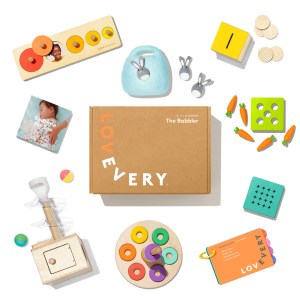What’s the real deal with the Montessori approach?

Never help a child with a task at which he feels he can succeed.
Maria Montessori
It sounds so simple, doesn’t it? And of course, it is simple… in theory. In practice, it’s a lot harder. Allowing children to perform everyday tasks themselves builds independence, confidence, and resilience. It also takes some extra time.
Yet when we let our children push the elevator or laundry machine buttons, pour their water, and wash their hands, they’re practising how to operate in their own little world. In Montessori terms, this is called “Practical Life”, and it’s one of the many reasons we love this method.
What is Montessori?
The Montessori method was developed by an Italian doctor named Maria Montessori in the early 1900s. Dr. Montessori was an inspiration, someone who broke gender barriers, fought for women’s rights and believed in educating children with learning differences.
Dr. Montessori believed in promoting independence in even the smallest children. She did this by carefully preparing the learning environment with a specific set of educational tools and by providing plenty of uninterrupted work time.
What we love about Montessori:
- Emphasis on less clutter, more order, and fewer playthings.
- Commitment to offering children the kinds of challenges that develop independence and concentration; willingness to let them struggle a bit.
- More natural and simple “open-ended” toys that help children understand and enjoy the real world.
- A thoughtful environment with child-sized furniture, low shelves, and stools to help children reach things for themselves.
- Belief in freedom of movement for babies and toddlers.
- Real-world, sensory-rich experiences.
- Time to cultivate a child’s focus and flow with limited interruption.
Where we look beyond Montessori:
- We believe in imaginative play—costumes, make believe, fantasy—which is not emphasized in Montessori.
- We believe in allowing children their own “right way” to play. In Montessori, the teacher often first shows the child how to engage with the materials.
- We believe in lots of baby talk. Research has shown that the higher-pitched sing-song voice that comes so naturally when adults are talking to babies actually helps develop language. The Montessori philosophy is that adults should speak to small children as they would speak to each other, with a more sophisticated language and tone. The Montessori emphasis on focus and concentration can be hard to balance with a child’s equally important need for narration and verbal stimulation.
In this post

The Play Kits
The Play Kits by Lovevery are thoroughly tested, baby safe, eco-friendly and Montessori inspired. Give your child the best start with our stage-based play toy subscription boxes.
Learn morePosted in: 11 - 12 Months, Montessori, Real World Play, Child Development
Keep reading

11 - 12 Months
Meet our Organic Cotton Baby Doll, a timeless doll for everyone
The Organic Cotton Baby Doll comes in three skin tones and is gender-neutral. Read more about our Baby Doll for everyone.

11 - 12 Months
Our favourite gifts for baby’s first birthday
First birthdays are a big deal and worth celebrating. Gifts are one way to mark the occasion. Here are our 15 favorites for your one-year-old.


11 - 12 Months
Welcome to The Thinker Play Kit for months 11-12
Watch Lovevery CEO Jessica Rolph introduce the Thinker Play Kit for months 11 and 12 of your baby's life.
